The organ music swells to fill the vaulted reaches of Westminster Abbey. Our nerve ends thrill, our pulses race and then, at last, the climactic moment is upon us. The star attractions have progressed into view, solemn, yet resplendent in their judicial robes of scarlet, gold or black.
The great and the good, from justice secretary Chris Grayling to the new lord chief justice Sir John Thomas, are now parading before us. The choir sings, the high notes angelically pure, and the Very Reverend Dr John Hall, Dean of Westminster, leads his procession of robed clerics to the Quire and Sacrarium.
There is no denying it: the British put on a good show. But that is enough, for the moment, of the pomp and pageantry of last week’s opening of the legal year (OLY). Let us also leave until later the perennial question of whether OLY is money well-spent and whether its Anglican context is inappropriate in our multi-cultural society. Let us instead begin on the eve of OLY and the learned debates of 30 September.
All in it together
The Gazette starts the day at Middle Temple’s decidedly un-austere Sherrard Room to hear a distinguished panel discuss ‘Justice in times of austerity’. It seems that for once we are genuinely ‘all in it together’ as speaker after speaker – from the UK, Germany, US, Australia, Canada and New Zealand – talks of cuts to funding and the erosion of access to justice.
Middle Temple treasurer Christopher Symons QC, in his words of welcome, shares with us his passion for British law. ‘I am proud that the vilest criminal gets representation in this country,’ he says. ‘And I am proud that foreigners can sometimes overturn the judgments of British courts.’ Our legal system, which places access to justice at its centre, has long been an exemplar for overseas jurisdictions. ‘They [the overseas jurisdictions] get the message,’ he says, ‘but do our politicians?’
Bar Council chair Maura McGowan QC, who is chairing the debate, asks the panellists to give a brief presentation before opening the discussion to the floor. Lucy Scott-Moncrieff, co-chair of the International Bar Association’s Access to Justice Committee and immediate past-president of the Law Society, warns that depriving vulnerable clients of legal aid funding will ‘lead to mistakes, with no lawyers to sort them out’. One possible solution is ‘unbundling’, she says, explaining that ‘unbundling’ has been described as ‘pay-as-you-go legal services, where lawyers do the bits that only they can do and the client does the rest.’
The Law Council of Australia president Michael Colbran QC says that legal services are also under-funded in his country, despite Australia avoiding the recession and having minimal debt. ‘There is already no legal aid for people facing criminal charges in magistrates’ courts,’ he tells us. ‘But the fault lies with us [lawyers]. We have failed to get the message across to government and the public that equality before the law is all-important.’
US bankruptcy court judge Elizabeth Stong reminds us of 19th-century British politician and prime minister William Gladstone’s maxim that ‘justice delayed is justice denied’. With some prescience, given that she is addressing us some hours before the US government shuts down over the budget stalemate in Congress, she says: ‘If the government shuts down, we have just enough money in reserve to last 10 days. Justice will be delayed and it will be denied.’
Rebecca Scott, a solicitor at the Royal Courts of Justice advice bureau, talks of the ‘crisis’ that has engulfed her sector. She says: ‘All of the week’s appointment slots [for prospective clients] are gone within two hours of opening our phone lines on Monday mornings. Litigants in person are now the norm and we are using unemployed graduates as volunteer advisers. Some 30% of our clients are vulnerable through disability, learning difficulties or language.’
Costs specialist Nicholas Bacon QC lightens the mood with an anecdote from his family’s breakfast table. He had mentioned that today he is to address lawyers from Croatia, Slovenia, Ghana, Malaysia, Japan and all points in between. His young daughter responded: ‘I didn’t know you spoke so many languages, daddy.’
Downward pressure
That ends the levity, as Bacon goes on to summarise the downward pressure on costs arising from Lord Justice Jackson’s review of civil litigation. He lists the familiar litany of doom – proportionality, costs budgeting, fixed costs, capping success fees and other changes – all consequent upon the coming into force of the Legal Aid, Sentencing and Punishment of Offenders Act 2012.
And so to lunch in Middle Temple with the international bar leaders, where the Gazette – by chance – sits with lawyers from Ireland, Malaysia and the US.
Next on the agenda is the bar leaders’ roundtable on legal education and training, chaired by Law Society president Nicholas Fluck. Professor Julian Webb, who led the research phase of the Legal Education and Training Review (LETR), a root-and-branch review published in June, is first to speak. He explains that before the LETR there was no clear evidence whether the present educational system was fit for purpose or not, but that there was a sense that ‘enhancing its quality, accessibility and flexibility’ was probably needed.
A delegate who asks not to be named responds with a measured analysis of the strengths and weaknesses of LETR. ‘It is a rigorous academic analysis and employs good methodology,’ he says. ‘But is it accessible?’ He quotes a line from the report starting with the words ‘relatively fluid developmental’ as an instance of the report’s ‘dysfunctional’ use of language. However, he concludes that the ‘exercise’ was valuable both for the depth of its research and the evidence it uncovered for the future.
Magic circle firm Clifford Chance academy director Tony King, who is the Law Society representative on LETR, says: ‘The current system is not fundamentally flawed and produces good-quality candidates.’ However, he proposes a range of improvements. ‘Communication between stakeholders is key,’ King says. ‘We need more focus on ethics, management training and training the trainers. Continuing professional development must be more than box-ticking.’ He adds that there should be more entry routes to the profession. ‘I don’t see a problem with the five-year articles route,’ he says, ‘it produced many excellent, non-graduate lawyers.’
Derek Wood QC, for the Bar Standards Board, tells us that he felt ‘some disappointment’ with LETR. He says: ‘It should be more challenging and more prescriptive – I want to know what we should be doing next.’ It was a ‘fine piece of academic research’, Wood adds, ‘but a shame that no practitioners were involved in writing it.’
Let us now return to the judicial and ecclesiastical spectacular that is the OLY. It begins for the Gazette with breakfast in the Law Society’s common room and the startling sight of bewigged and robed judges, dressed in the style of the 18th century, tucking into croissants and ham and eggs.
Fluck reminds us that OLY ‘is not just about pageantry or pomp and ceremony’. On the contrary, he says: ‘It’s a time for us to meet as members of a global profession to reflect on those most fundamental principles: access to justice and upholding the rule of law, and to reaffirm our commitment to them.’
‘Not a passive act’
Fluck adds: ‘Living a life as a lawyer is not a passive act. Rights which are not defended stop being rights pretty quickly. We are crucial in helping to defend those rights, to shape and maintain the law… We must not ever forget that it’s the law which underpins every stable society. Look to Tahrir Square in Cairo, or to Syria, to see what happens when the rule of law fails.’
Bar Council vice-chair Nicholas Lavender QC greets the delegates with a potted history of Westminster Hall, the oldest building in the parliamentary estate and where most delegates are invited to ‘the Lord Chancellor’s Breakfast’ at lunchtime.
Westminster Hall, he tells us, was where the 13th-century Scottish rebel William Wallace, the Braveheart of Hollywood legend, was tried and sentenced to being drawn and quartered. It was also the site where English lawyer Sir Thomas More, the subject of the film A Man for all Seasons, was found guilty of perjury and had his head chopped off. And where Charles I, King of England, was tried by his subjects and executed.
On a lighter note, Lavender tells a joke about, of all things, multi-disciplinary practices (MDP). A member of the American Bar Association is reputed to have said that the only MDP ever to work was one where a veterinary surgeon and a taxidermist set up in business together. Their success owed much to the company slogan: ‘Whatever happens, you get your dog back.’
Next the Gazette clambers on to a coach bound for Westminster Abbey, where the aforementioned music and judges are to be found. The hymn singing is reminiscent of most wedding ceremonies, where a few know the tune and the rest mime the words. There are moments of keen anticipation, however, particularly when the justice secretary approaches the lectern to read the first lesson.
Grayling’s chosen text is Micah 6: 1-8, which is not only the motto of the Lawyers Christian Fellowship, but also a lexicological minefield for anyone seeking to avoid a Jeremy Hunt-style slip of the tongue. We wait with bated breath to see how he copes with ‘Balak’ as in ‘King Balak of Moab’, not to mention ‘Shittim’. To the relief of everyone, he is word perfect, enunciating with the clarity of a head boy on Founder’s Day. He is so good, in fact, that no hoots of derision greet his question: ‘O my people what have I done to you?’
The service carries on through a sermon and more hymns until we reach ‘The Prayers’, selected – one assumes – to embrace all the legal jurisdictions represented at OLY, as well as public servants and others. The first prayer is offered up to the royal family and the second to the victims and perpetrators of crime.
The first half of the third prayer deserves quoting in its entirety: ‘Let us pray for all who administer justice in this realm; for all judges, magistrates, jurors, ombudsmen, and the tribunals judiciary; for clerks and court officials; for barristers, solicitors, and all whose profession or expertise is the law [such as legal executives and paralegals].’
The fourth prayer widens the scope of the third prayer from ‘this realm’ to include the EU, while the fifth and sixth call upon God to help judges and others fulfil their sacred duties in ensuring that justice is done. The sixth prayer also, to the surprise of at least one observer of legal services, describes Jesus Christ as ‘our advocate and mediator’.
Sadly, no prayers are offered for the international bar leaders at OLY from outside Europe, such as Australia, Canada, the US, Ghana, Japan, Malaysia, New Zealand and the rest.
The national anthem brings proceedings within the abbey to a close and gives us all the opportunity to mug up on the second verse. For the record, it rhymes ‘May she [the Queen] defend our laws’ with ‘and ever give us cause’. The procession then files out, led by the lord chief justice, the master of the rolls, the presidents of the Queen’s Bench and family divisions and the chancellor of the High Court, all with their suites of train carriers and clerks.
Next come the lord justices of appeal and puisne (pronounced ‘puny’) judges, who are any High Court judge apart from the heads of divisions. With them are also law officers of the Crown, the judiciary, Queen’s Counsel, Law Society representatives, including the president, and barristers.
Really necessary?
It is a noble spectacle, but one is left wondering whether it is really necessary for circuit judges, inter alia, to wear knee breaches, silk stockings and buckle shoes to complement their purple robes trimmed with lighter purple taffeta facings and cuffs. Such an outfit would raise eyebrows in most walks of life. It leads one to wonder whatever next – surgeons sporting leather aprons and brandishing hacksaws, perhaps?
The two-day event must have been expensive; is that justified when clients are going unrepresented and colleagues are joining the dole queue? But it is worth every penny in the sense that delegates from overseas jurisdictions are able to network with our lawyers, see how we have been doing things since the Magna Carta in 1215 and form alliances to reinforce access to justice and open up commercial opportunities.
What about the religious context of OLY? The procession of judges is no longer exclusively pale, male and stale, but includes women and individuals of all ethnicities. No one seemed offended by the Christian service. The Sikh judge, wearing a turban rather than a wig, for example, did not flee the Abbey, hands pressed to his ears, when Christian dogma was pronounced.
Indeed, our modern-day judiciary has never been accused of a Christian bias, as witnessed by recent cases where judges ruled that certain women wearing crucifixes to work should remove them.
To finish on a lighter note, the Gazette will not name and so spare the blushes of a woman overheard at lunchtime saying: ‘Didn’t you think with those red robes and white wigs they looked like Father Christmas?’























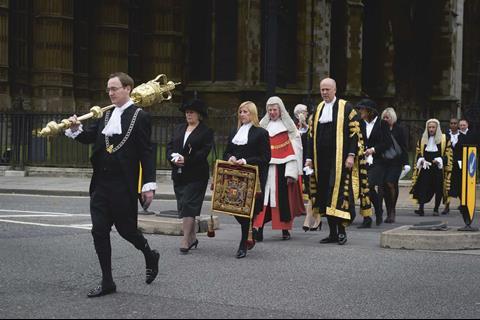
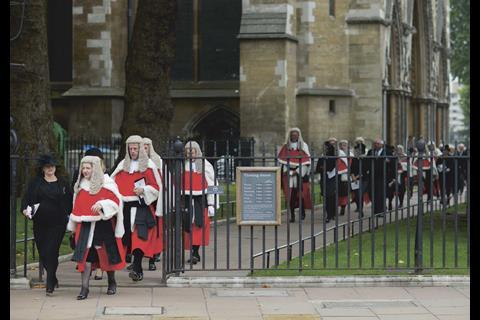
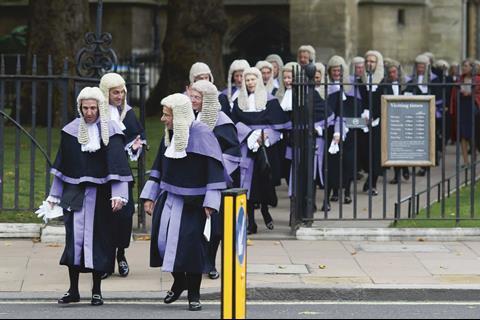
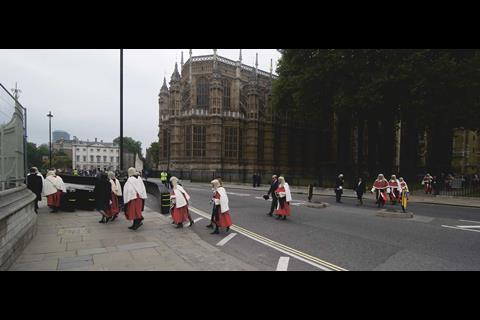
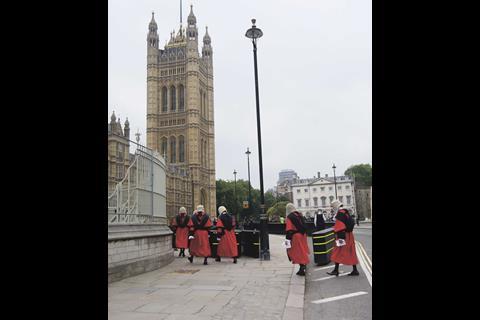
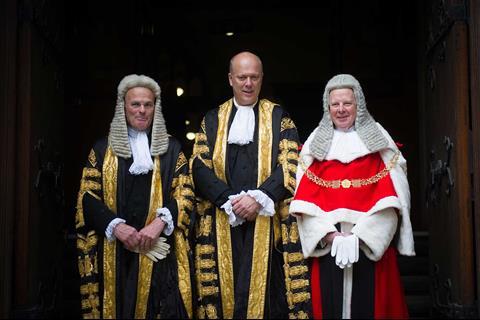
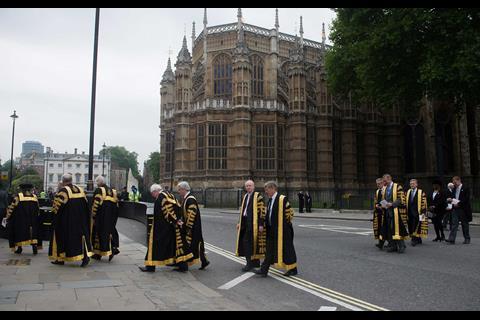
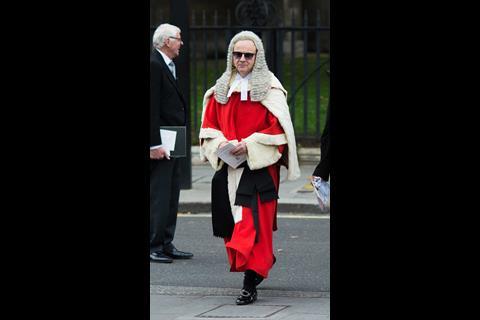
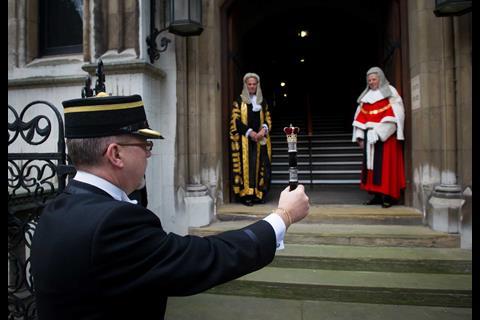
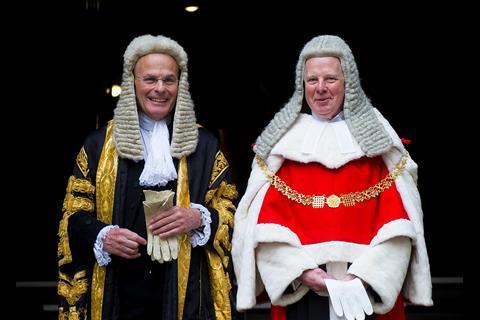
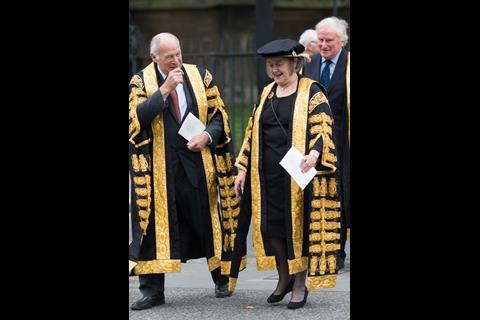




No comments yet